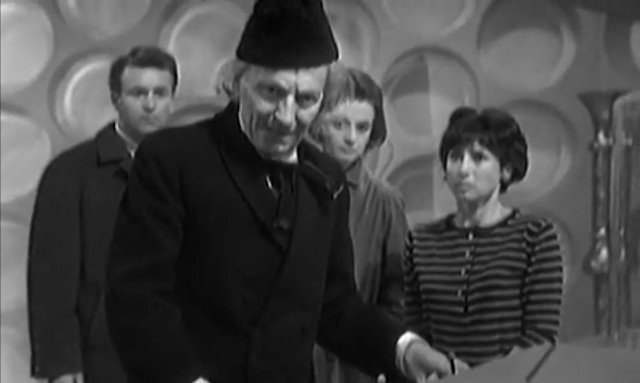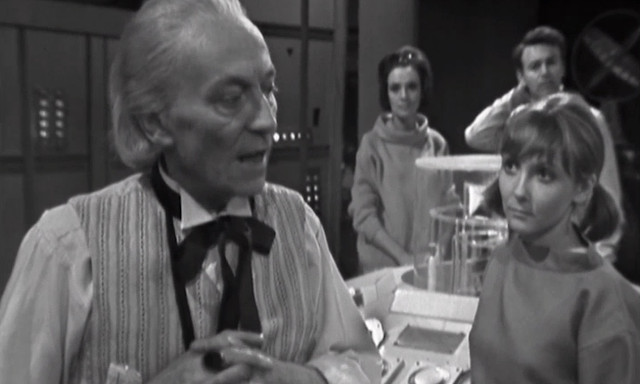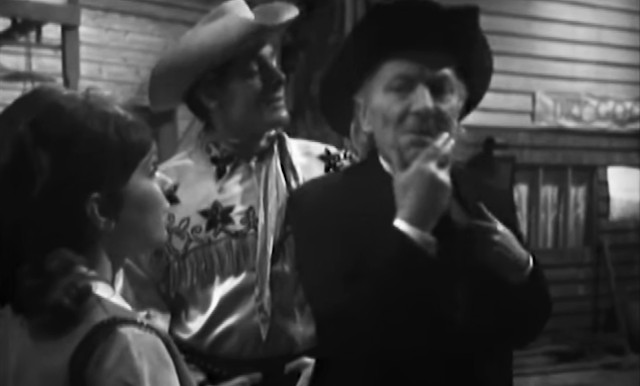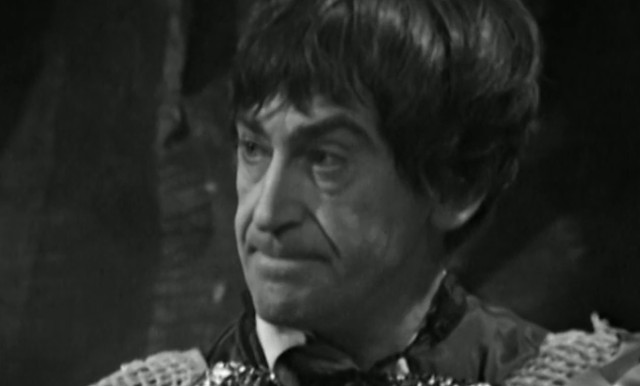Classic Doctor Who can seem like a vast and daunting universe to explore. With 26 seasons and numerous Doctors, knowing where to begin, especially with the very first incarnation, William Hartnell’s Doctor, can be overwhelming. If you’re curious about the origins of the Doctor, or simply want to delve into the very beginning of this iconic sci-fi series, this guide to the First Doctor’s era is for you. We’ll break down the best episodes and stories to watch, helping you jump into Classic Who with confidence.
While many recommend starting with later Doctors due to the evolving nature of the show, there’s a unique charm and historical significance to beginning at the very beginning with William Hartnell. His era laid the foundation for everything that followed, introducing key concepts, iconic villains, and the very essence of the Doctor himself. Let’s explore the First Doctor’s seasons and highlight the must-watch episodes to get you started on your Classic Who journey.
Diving into the First Doctor’s Era: Episode by Episode Breakdown
The First Doctor’s era is a fascinating blend of historical adventures and early science fiction explorations. Season 1 is particularly formative as the show finds its footing, balancing educational elements with thrilling storytelling. Here’s a season-by-season guide to the First Doctor’s episodes, helping you navigate what to watch, maybe watch, or skip.
Season 1 (1963-1964) – The Genesis of a Legend
Season 1 is where it all began. It’s a mix of historical and sci-fi, defining the early tone and style of Doctor Who.
An Unearthly Child – Watch
 The First Doctor, William Hartnell, standing in front of the TARDIS in An Unearthly Child, the very first Doctor Who episode, showcasing its historical and eerie atmosphere.
The First Doctor, William Hartnell, standing in front of the TARDIS in An Unearthly Child, the very first Doctor Who episode, showcasing its historical and eerie atmosphere.
The very first episode of Doctor Who is essential viewing. The initial episode, “An Unearthly Child,” is a masterclass in mystery and atmosphere, setting up the enigmatic Doctor and his granddaughter Susan. It’s a perfect blend of The Twilight Zone and Narnia, introducing the TARDIS and the Doctor in an intriguing way. While the subsequent episodes in this serial (“The Cave of Skulls,” “The Forest of Fear,” “The Firemaker”) are less compelling and quite dated, the first episode alone is a must-see for understanding the show’s origins.
The Daleks – Watch
 The First Doctor, William Hartnell, standing in front of the TARDIS in An Unearthly Child, the very first Doctor Who episode, showcasing its historical and eerie atmosphere.
The First Doctor, William Hartnell, standing in front of the TARDIS in An Unearthly Child, the very first Doctor Who episode, showcasing its historical and eerie atmosphere.
Introducing the Doctor’s most iconic foes, “The Daleks” is a significant story in Doctor Who history. While it might have some slower moments and pacing typical of early Classic Who, it establishes the Daleks as a terrifying and relentless enemy. Witness their first appearance and the initial conflict between the Doctor and these pepper-pot shaped villains. Even if you find parts a bit drawn out, the historical importance and the chilling cliffhangers, like the first Dalek reveal, make it worthwhile.
The Edge of Destruction – Watch
“The Edge of Destruction” is a unique and tightly focused two-episode story set entirely within the TARDIS. It’s a paranoid and claustrophobic drama that explores the TARDIS crew’s dynamics under pressure. Crucially, it marks a turning point for the First Doctor, showing a softening of his initially cold and aloof persona. This character development makes it a valuable episode to watch.
Marco Polo – Skip (All Episodes Missing)
While “Marco Polo” is sadly a completely lost serial, reconstructions suggest it was visually impressive and epic in scope. However, the story itself is reported to be slow-paced, and reconstructions can be challenging for new viewers. Unless you’re a dedicated completist, it’s best to skip this one for now.
The Keys of Marinus – Skip
“The Keys of Marinus” is an adventure sequence by Terry Nation that, while not terrible, is considered filler. It doesn’t add significantly to the overall narrative or character development. It’s skippable for those just starting out.
The Aztecs – Watch
 The First Doctor, William Hartnell, standing in front of the TARDIS in An Unearthly Child, the very first Doctor Who episode, showcasing its historical and eerie atmosphere.
The First Doctor, William Hartnell, standing in front of the TARDIS in An Unearthly Child, the very first Doctor Who episode, showcasing its historical and eerie atmosphere.
“The Aztecs” is a standout historical episode and often considered one of the best of the First Doctor’s era. It presents a compelling moral dilemma: should the Doctor and his companions interfere in history? Barbara’s attempt to change Aztec society drives the drama, making it a thought-provoking and engaging story. It’s a prime example of the historical adventures that Classic Who excelled at.
The Sensorites – Skip
“The Sensorites” has some interesting moments but is generally considered tedious and overlong. While it does feature Susan giving the first description of the Time Lords’ home planet, these moments are not enough to justify watching the entire serial for a newcomer.
The Reign of Terror – Maybe (Episodes 4 & 5 Missing)
“The Reign of Terror,” set during the French Revolution, is a darker historical serial. Despite episodes 4 and 5 being missing (and reconstructed), it’s a reasonably engaging story. The Doctor’s humorous disguise adds some levity. If you’re comfortable with reconstructions, it might be worth a “maybe” for its historical setting and darker tone.
Season 2 (1965) – Expanding Horizons
Season 2 sees the TARDIS team more bonded and William Hartnell settling into a more avuncular portrayal of the Doctor.
Planet of Giants – Watch
 The TARDIS crew miniaturized in Planet of Giants, a fun and inventive adventure with a unique premise, showcasing the early imaginative storytelling of Doctor Who.
The TARDIS crew miniaturized in Planet of Giants, a fun and inventive adventure with a unique premise, showcasing the early imaginative storytelling of Doctor Who.
“Planet of Giants” is a fun, short adventure with a unique premise: the TARDIS crew is miniaturized on Earth. It’s a creative and engaging story that’s easy to watch and enjoy. Its shorter length compared to other serials of the era makes it a good entry point.
The Dalek Invasion of Earth – Watch
 The TARDIS crew miniaturized in Planet of Giants, a fun and inventive adventure with a unique premise, showcasing the early imaginative storytelling of Doctor Who.
The TARDIS crew miniaturized in Planet of Giants, a fun and inventive adventure with a unique premise, showcasing the early imaginative storytelling of Doctor Who.
“The Dalek Invasion of Earth” is considered slightly overrated by some, but it’s undeniably iconic for its visuals of Daleks in London. The final scene, featuring the First Doctor’s poignant speech, is a highlight and considered one of his best moments. It’s a visually striking and historically important Dalek story.
The Rescue – Skip
“The Rescue” is a shorter, middling story introducing companion Vicki. It’s not unmissable and can be skipped without missing crucial plot points.
The Romans – Watch
“The Romans” is a fun, historical romp with a comedic tone. Ian spends a good portion of the story in a toga, and the First Doctor gets involved in comedic fisticuffs at Nero’s court. It shows the Doctor becoming more proactive and is an entertaining historical adventure.
The Web Planet – Skip
“The Web Planet” is ambitious in its character designs and alien world, but it’s hampered by stylistic choices and a slow plot. While visually unique, it’s generally skippable due to its pacing and overall story.
The Crusade – Watch (Episodes 2 & 4 Missing)
Despite two missing episodes (2 & 4), “The Crusade” is a terrific historical story set during the Crusades. Julian Glover and Jean Marsh’s guest performances are compelling, and the story as a whole “works” well even with the missing parts.
The Space Museum – Skip
“The Space Museum” has a neat concept but doesn’t quite deliver on its potential. It’s not particularly memorable and can be skipped.
The Chase – Maybe
“The Chase” is a mixed bag, but it features the departure of original companions Ian and Barbara, which is a significant moment. If you want to witness their exit, it’s worth a “maybe.”
The Time Meddler – Maybe
“The Time Meddler” is a bit slow-paced, but it’s historically significant as it introduces the first Time Lord outside of the Doctor’s family, the Monk. The medieval setting is also interesting. It’s a “maybe” for its historical importance and the introduction of a new Time Lord element.
Season 3 (1965-1966) – Ambition and Change
Season 3 is uneven but ambitious, culminating in the epic “The Daleks’ Master Plan.” Hartnell’s performance strengthens, even with his declining health.
Galaxy 4 – Skip (Episodes 1, 2 & 4 Missing)
“Galaxy 4,” despite some good moments in the surviving episodes, is largely skippable due to its slow pacing and reliance on the Chumblies robots. The missing episodes further hinder its watchability for newcomers.
Mission to the Unknown – Maybe (Missing)
“Mission to the Unknown” is a unique, single-episode story designed to set up “The Daleks’ Master Plan.” While the original is missing, fan remakes are available. It’s a “maybe” if you are interested in the lead-up to the epic Dalek serial.
The Myth Makers – Skip (All Episodes Missing)
“The Myth Makers,” set during the siege of Troy, sounds entertaining in concept, but as a completely lost serial, it’s a chore to experience through reconstructions alone. The exposition-heavy nature of reconstructions makes it a skip for most viewers.
The Daleks’ Master Plan – Watch (Episodes Missing)
 The expansive and epic Daleks' Master Plan, a major Dalek story in the First Doctor's era, despite numerous missing episodes, highlighting its historical importance and dark tone.
The expansive and epic Daleks' Master Plan, a major Dalek story in the First Doctor's era, despite numerous missing episodes, highlighting its historical importance and dark tone.
“The Daleks’ Master Plan” is an epic and dark Dalek tale, considered a highlight of the First Doctor era despite numerous missing episodes. It’s ambitious and has real consequences for the Doctor. While bloated, it showcases William Hartnell at his best and is a significant story in Doctor Who lore. Skip “The Feast of Steven” within this serial, as it’s a Christmas filler episode.
The Massacre of St Bartholomew’s Eve – Maybe (All Episodes Missing)
“The Massacre of St Bartholomew’s Eve,” another lost serial, is a serious and thoughtful historical story. The ending, dealing with non-interference, is particularly strong. If you’re willing to engage with reconstructions, the ending alone might make it a “maybe.”
The Ark – Watch
“The Ark” is a dorky but important time travel adventure that introduces sci-fi concepts that reappear in Doctor Who later on. It’s a worthwhile watch for its thematic relevance to the series’ overall mythology.
The Celestial Toymaker – Watch (Episodes 1, 2 & 3 Missing)
“The Celestial Toymaker” is a unique and high-concept story where the Doctor is trapped in the realm of the Celestial Toymaker, forced to play games. Despite missing episodes, it’s an interesting and conceptually strong story, though perhaps slightly overrated compared to “The Mind Robber” in later seasons.
The Gunfighters – Maybe
“The Gunfighters” is a quirky historical episode where the First Doctor is mistaken for Doc Holliday in Tombstone. While it can be repetitive and the theme song is overused, it’s part of the “First Doctor Experience” and might be a fun, if flawed, watch.
The Savages – Watch (All Episodes Missing)
“The Savages” is unfortunately another lost serial, but it’s considered a shame as it’s a morality tale where the Doctor is righteously defending an oppressed people. Its themes and the Doctor’s strong moral stance make it a worthwhile story to experience in reconstruction form.
The War Machines – Maybe
“The War Machines” is the last complete Hartnell episode and introduces companions Ben and Polly, while providing an exit for Dodo. It’s an okay story, if somewhat forgettable, but notable for companion introductions and being Hartnell’s last complete serial.
Season 4 (1966-1967) – Regeneration and Transition
Season 4 marks a monumental shift with William Hartnell’s departure and the introduction of Patrick Troughton as the Second Doctor, pioneering the concept of regeneration.
The Smugglers – Skip (All Episodes Missing)
“The Smugglers” is a rote historical episode with nothing particularly noteworthy. The first scene, where Ben and Polly accidentally become TARDIS passengers, is a fun character moment, but overall, it’s skippable.
The Tenth Planet – Watch (Episode 4 Missing)
 The First Doctor's regeneration in The Tenth Planet, a pivotal moment in Doctor Who history, showcasing the introduction of the Cybermen and the concept of regeneration.
The First Doctor's regeneration in The Tenth Planet, a pivotal moment in Doctor Who history, showcasing the introduction of the Cybermen and the concept of regeneration.
“The Tenth Planet” is historically essential as it features the very first regeneration of the Doctor and the introduction of the Cybermen in their classic, chilling design. While the plot itself isn’t the most exciting, witnessing these key Doctor Who milestones makes it important viewing. Episode 4, the regeneration episode, is unfortunately missing.
The Power of the Daleks – Watch (All Episodes Missing)
“The Power of the Daleks” is a classic serial worth experiencing in reconstruction, especially fan-made versions. It showcases Patrick Troughton’s initial portrayal of the Doctor as a zany and unpredictable figure, raising questions about his safety and intentions after regeneration. It’s a key story in understanding the transition between Doctors.
The Highlanders – Skip (All Episodes Missing)
“The Highlanders” introduces companion Jamie McCrimmon, a beloved figure in the Second Doctor’s era. However, the story itself is a snoozefest, with the Doctor mostly engaging in silly accents and costume changes. Focus on Jamie’s introduction in summaries if needed, but the serial itself is skippable.
The Underwater Menace – Skip (Episodes 1 & 4 Missing)
“The Underwater Menace” has some humorous moments with Troughton but is generally slow and considered weak. The famously corny line delivery is meme-worthy, but not enough to recommend watching the entire serial.
The Moonbase – Watch (Episodes 1 & 3 Missing)
“The Moonbase” is a taut and well-regarded base-under-siege story featuring the Cybermen. It’s a strong Polly episode and showcases Troughton settling into his role as the Doctor. It’s a solid Cyberman story and a good example of the era.
The Macra Terror – Skip (All Episodes Missing)
“The Macra Terror” is set in a utopian society with a dark secret. While quirky and intriguing in concept, it doesn’t quite go anywhere substantial and is ultimately skippable.
The Faceless Ones – Maybe (Episodes Missing)
“The Faceless Ones” is a murder mystery set at an airport. It’s a fine story that highlights the developing dynamic between Troughton and Frazer Hines. It’s also notable as the final episode for Ben and Polly. If interested in companion departures and Troughton/Hines dynamic, it’s a “maybe.”
The Evil of the Daleks – Maybe (Episodes Missing)
“The Evil of the Daleks” is an interesting story that starts to explore a more complex side to the Daleks and showcases the Second Doctor’s manipulative nature. The first half is strong, but the second half is weaker. The showdown between Troughton and the Daleks is a highlight, but the rest might be a slog through reconstructions.
Key Themes and Characters of the First Doctor Era
The First Doctor’s era is characterized by several key themes:
- Exploration and Discovery: The early seasons emphasized exploration, both of history and the universe. Many stories are about discovering new worlds, civilizations, and historical periods.
- Historical Learning: Initially conceived partly as an educational program, historical stories are prominent, often posing questions about history and intervention.
- Character Development: The First Doctor starts as a more alien and morally ambiguous figure, gradually developing into a more heroic and compassionate character. The companions, particularly Barbara and Ian, play a crucial role in grounding and humanizing him.
- The Mystery of the Doctor: The Doctor’s origins and nature are deliberately kept mysterious, adding to his enigmatic persona.
Key characters introduced in this era include:
- The First Doctor (William Hartnell): Initially gruff and mysterious, he evolves into a grandfatherly figure, though still retaining a sharp intellect and alien perspective.
- Susan Foreman (Carole Ann Ford): The Doctor’s granddaughter, young and intelligent, but also somewhat vulnerable.
- Barbara Wright (Jacqueline Hill) & Ian Chesterton (William Russell): Schoolteachers who become accidental companions, representing the audience’s point of view and providing moral grounding.
- Vicki (Maureen O’Brien) & Steven Taylor (Peter Purves): Later companions who bring youthful energy and different perspectives to the TARDIS crew.
- The Daleks: Doctor Who’s most iconic villains, introduced in the First Doctor’s era and becoming recurring antagonists.
- The Cybermen: Another iconic villain group, also introduced during the First Doctor’s time, though their redesign in “The Tenth Planet” is markedly different from later iterations.
Where to Watch First Doctor Episodes
Watching Classic Doctor Who, including the First Doctor episodes, is easier than ever thanks to streaming services.
- BritBox: A comprehensive streaming service dedicated to British television, BritBox often has a large collection of Classic Doctor Who episodes, including many from the First Doctor era. Check BritBox in your region for availability.
- Tubi (US): In the US, Tubi is a free, ad-supported streaming service that has a significant amount of Classic Doctor Who available for free, making it an excellent and accessible option.
- BBC iPlayer (UK): For viewers in the UK, BBC iPlayer is the primary source for Doctor Who content, including Classic Who. Check iPlayer for current availability of First Doctor episodes.
- DVD and Blu-ray: Physical media releases of Classic Doctor Who are available and often contain restored versions and bonus features. These are a good option for collectors and those wanting the highest quality viewing experience.
- Animated Reconstructions: For missing episodes, the BBC has produced official animated reconstructions, and fan-made telesnap reconstructions are also available online. These can help fill in the gaps for lost stories, although viewing experiences vary.
Embrace the Beginning
Starting with the First Doctor might seem like diving into the deep end of Classic Who, but it’s a rewarding experience. You witness the birth of a legend, the origins of iconic elements, and the evolution of the Doctor character himself. While some episodes are slower-paced and technically dated compared to modern television, the charm, historical significance, and foundational storytelling of the First Doctor’s era are undeniable.
Use this guide to navigate the best episodes, and you’ll be well on your way to appreciating the very beginning of the Doctor’s incredible journey through time and space. Happy watching!

